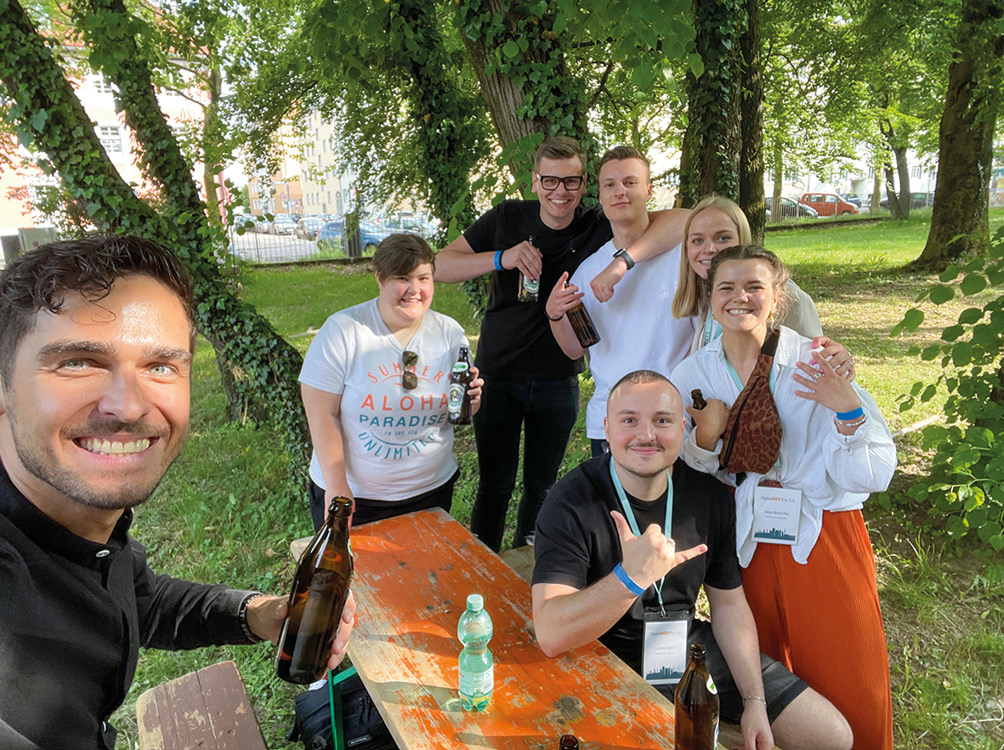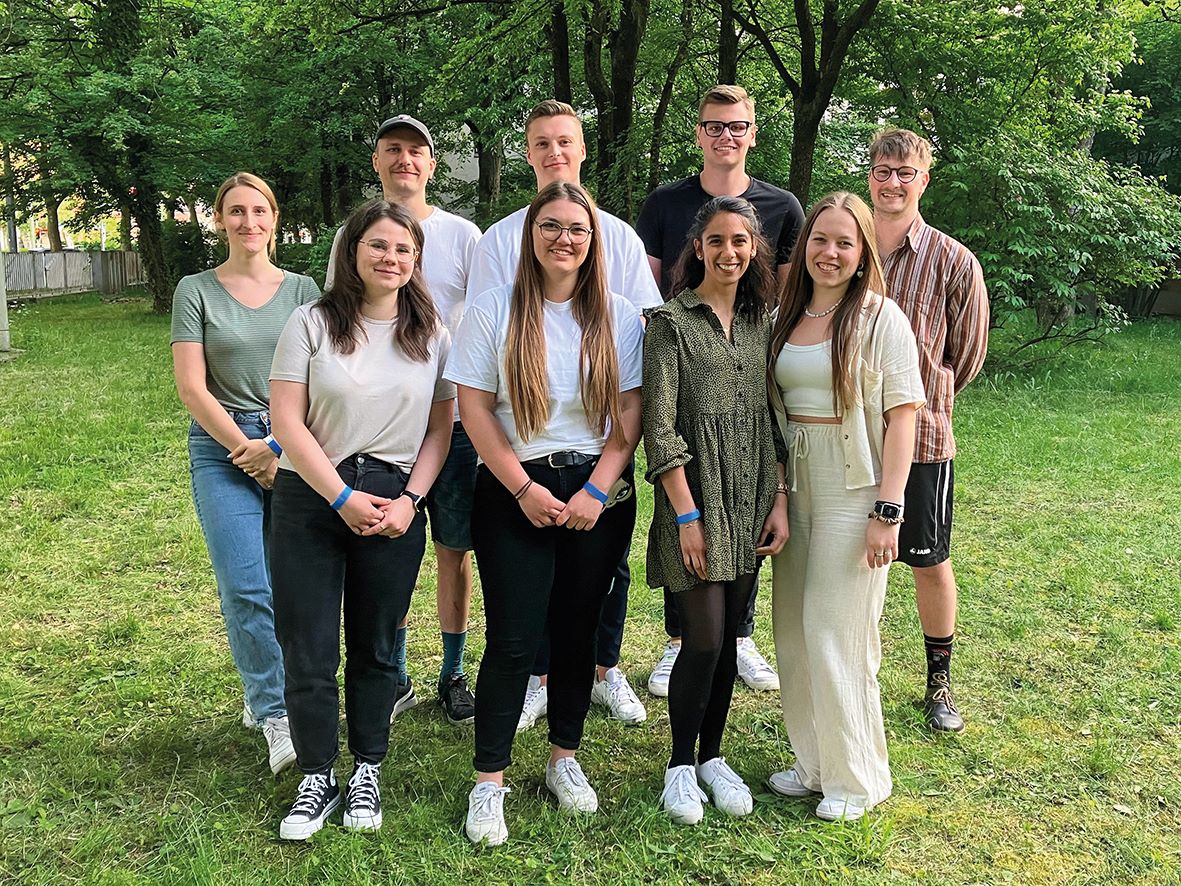OptoMEETry 3.0 by VDCO Young

On the first weekend of June, the members of VDCO Young came together to experience professional politics and to debate the rights and duties of the optometrist profession. The 48 students from the Höheren Fachschule für Augenoptik Köln, Berliner Hochschule für Technik (BHT), Technischen Hochschule Brandenburg (THB), Ernst-Abbe-Hochschule Jena, Hochschule München (HM) und Hochschule Aalen spent a weekend together in Munich. An early arrival already on Friday allowed for a casual and relaxed getting to know each other in the lively areas of Munich. On Saturday, after a joint lunch, OptoMEETry 3.0 started at 1 pm at Hochschule München.
In addition to the VDCO Young student representatives, the day's participants included panelists Dr. Matjaž Mihelčič (ECOO President), Manuel Kovats (SBAO President), Dr. Jan Wetzel (ZVA Managing Director), Dr. Amir Parasta (AI expert and ophthalmologist), Prof. Dr. Holger Dietze from the BHT and the experienced and renowned optometrist Stefan Schwarz. Stephan Hirschfeld, 1st Chairman of the VDCO, as well as Esther Adam-Pennewitz and Reya Kons participated from the VDCO Board.
OptoMEETry 3.0 started this year with a short summary of the results of the previous OptoMEETry and an introduction to the importance of the regular inter-university meeting between students. At the request of the students, Prof. Dr. Holger Dietze explained the European Diploma and its significance. Afterwards, the essential part of this year's OptoMEETry 3.0 began. The participants of the panel discussion first had to face the questions of the student representative Markus Schuldt (BHT) and the representative Larissa Menz (THB).


With all the love for the variety, the question was raised how many variants of the degree title are needed to be able to practise optometry. Currently, there are nine recognised degree titles in addition to training to become a "specialist": M.Sc. in Clinical Optometry, B.Sc. (Optometry), M.Sc. (Optometry), Master Optometrist, State-certified Optometrist, Dipl.-Ing. (FH), Optometrist (HWK), Bachelor Professional and Master Professional. These titles not only lead to confusion among patients, but are hardly assessable by practitioners of the profession. The students are concerned to create a clear line here without getting lost in trivialities and limiting the profession in its legal possibilities. In Germany, an independent professional profile for optometrists should be created. The term optometrist should be protected. Currently, the tasks of the optometrist are exclusively written down in the working guidelines of the ZVA for optometrists. This is the basis for gaining more rights and recognition by ophthalmologists, health insurance companies and in politics. The end consumer's perception of the profession must be strengthened externally and its content must be better clarified. However, it quickly became clear to all participants that this is the longest process. The students continued their question by asking what a full eye examination includes. Templates for the introduction of own working guidelines for optometrists could be the working guidelines of the RAL Gütegemeinschaft Optometrische Leistungen.
The panelists agreed that the advancing technological development, be it in the field of device manufacturing or AI, is changing the working methods of optometrists faster in recent years than it was the case in the past. Therefore, the students were advised not to define the profession too narrowly, because this would unnecessarily prematurely block paths for still unknown possibilities. The concern that AI could take over parts of the tasks of an optometrist in the future was quickly dispelled. The AI should serve to expand the possibilities and take over what optometrists cannot do, for example, to enable matching by using large amounts of data. With this additional information, the optometrist's experience can be expanded and the AI provides an additional assessment and more certainty.

There was no question that the newly introduced innovations must definitely be reflected in the education of optometrists. One criticism of the education in Germany was expressed by the students with regard to heterogeneity. The panelists conveyed that, in addition to the content of a course of study, it is much more important to teach practical skills and abilities. Through a high number of eye examinations, which are carried out independently with professional guidance during the course of study, the accumulated experience and thus the competence of each individual can grow. The acquisition of these practical skills is possible through internships with at an optometrist, in contact lens institutes, ophthalmological specialist institutions or clinics. In this way, each student can get an idea of the individual possibilities for practising optometry. In the second round of the panel discussion, moderated by Jasper Ufert and Tom Luis Platten, the participating students were also able to contribute to the ongoing debate with questions and statements. The representatives of the Young Sponsors who were present also contributed in order to pass on their knowledge and experience to the students and to create political incentives. Anke von Ahrentschildt (Oculus), Benjamin Krog (TopconHealthcare), Laura Hanenberg (Cooper Vision), Danijel Brlekovic (bonOptic Vertriebsgesellschaft) and Linda Dapprich (Rodenstock) described individual possibilities and opportunities for students both during and after their studies.
The students looked for clear solutions and regulations for their profession and found insights into the politics of the profession and wide variety of correct, albeit different, opinions. Finding a consensus here is definitely possible. The task of the various professional associations in cooperation with the ZVA and the training institutions is to set the right standards and create the relevant conditions. After the panel discussion, the debates about the profession were continued at the barbecue in the HM Studi-Club, and fun was not missed out either. OptoMEETry is financed by the VDCO's edu-Points. By purchasing edu-Points, everyone can support the VDCO Young in its projects. At this point, the student members of the VDCO would like to thank all private sponsors 2023 as well as Alcon, bonOptic, Cooper Vision, HECHT Contactlinsen, Hoya, OCULUS Optikgeräte, Rodenstock and TopconHealthcare.